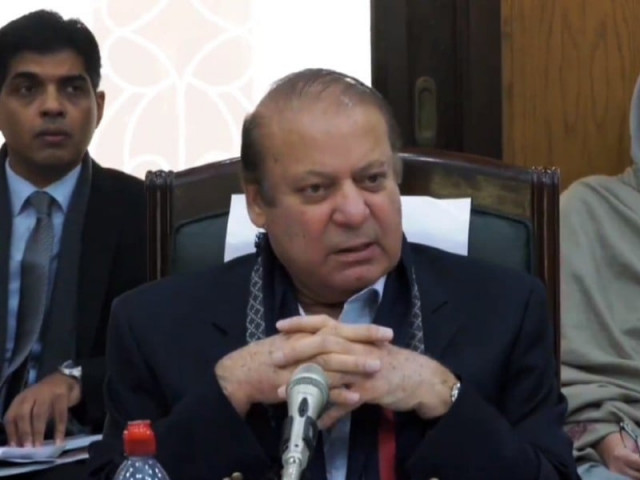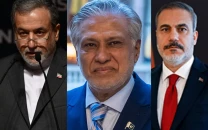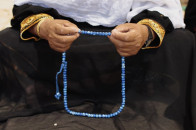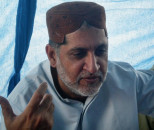Nawaz put on a brave face
Ex-PM’s vision for coalition govt clashes with the stark reality portrayed by ECP’s dashboard

In the aftermath of the electoral storm that swept through Thursday's general elections, leaving behind allegations of pre-poll trickery and delayed results, PML-N supremo Nawaz Sharif put on a brave face by claiming a victory even though the final results were still awaited on Friday, that shows a lack of democratic spirit.
The former premier extended an olive branch, pledging to accept the mandate bestowed upon all parties and independent candidates, ushering in a spirit of cooperation as uncertainty reigned the political landscape.
In a strategic move, Nawaz unveiled plans to build a coalition, nominating key figures of his party former prime minister Shehbaz Sharif and Ishaq Dar to engage the Pakistan People's Party (PPP) and other smaller groups, mainly the component parties that were allies in the previous 16-month term of PDM to form a coalition government with his party at the forefront.
However, his optimistic vision clashes with the stark reality portrayed by the Election Commission of Pakistan's (ECP) dashboard, which paints a different picture of electoral outcomes.
Independent candidates, an overwhelming majority of them backed by PTI, dominate the tally, and questions arise regarding PML-N's ability to secure a majority to form a government.
Even three hours after Nawaz Sharif’s “victory” speech (at 11pm), independents were leading the table with 96 seats followed by PML-N’s 66 and PPP’s 51 followed by other smaller parties while results on 29 National Assembly constituencies were still waiting.
Sharif's apparent omission from the prime ministerial candidacy further underscores the intricate web of legal, constitutional, and political complexities awaiting resolution in the post-election phase.
One thing became abundantly clear amid the uncertainty surrounding PML-N: the prospect of forming a government independently was simply out of reach, given their lack of a single majority. It was evident that they would need to forge alliances with other parties to cobble together a governing coalition, if at all possible.
Furthermore, Nawaz Sharif's speech hinted at a significant shift in ambitions within PML-N. The notion of him vying for the coveted position of Prime Minister for a fourth term, a cornerstone of the party's election campaign and prominently featured in full-page advertisements, now appears to be a thing of the past.
The unexpected outcome of the elections has sent shockwaves across the political spectrum, prompting serious legal, constitutional, and political deliberations among all stakeholders, including political parties, the judiciary, and the powers that be.
These deliberations are expected to unfold over the next two weeks, paving the way for the transition of power to the government elected as a result of the February 8, 2024 elections.
Read: Solangi congratulates nation on successful conduct of elections
Of paramount importance in these deliberations is the handling of PTI's mandate. Once hailed as the favoured party of the powerful establishment, PTI fell out of favour nearly two years ago.
Despite the contentious nature of Thursday's election results, it's undeniable that PTI has emerged victorious against all odds, particularly in Khyber Pakhtunkhwa (K-P), where it secured an unprecedented majority in both the National Assembly and provincial assembly seats.
This sweeping victory has effectively marginalised other parties that once held strongholds in the province. Additionally, PTI has solidified its position across Punjab, garnering significant support in terms of votes, if not necessarily seats.
The mandate of PTI cannot be disregarded, yet the decision by the ECP to strip PTI of its election symbol, later endorsed by the Supreme Court, poses unprecedented challenges for the party, not only during the election phase but also in the post-election period.
Once the final results are revealed, the allocation of reserved seats for women and minorities to political parties across all legislatures will commence.
However, the current constitutional and electoral laws do not address the allocation of reserved seats to legislators without party affiliations, as is the case in Khyber Pakhtunkhwa now where there is no way other than giving PTI-backed independents to form a government.
This dilemma is compounded by the largest group of independents returning to the National Assembly and Punjab Assembly as well since the non-party-based elections of 1985.
Various scenarios are being considered: the larger parties, PML-N and PPP, may seek to court independents to bolster their numbers before the allocation of reserved seats, potentially leading to unprecedented horse-trading. Alternatively, a major political party like PPP could absorb this independent chunk into a coalition government.
However, none of these scenarios promises stability.
Given the country's dire economic crisis and the need to adhere to IMF programs requiring further austerity measures, governance without public legitimacy will be exceedingly challenging, if not impossible.
The solution lies in a thorough reconsideration of stakeholder positions, grounded in an understanding of the ground realities and the people's mandate. This process is crucial not only among political leaders but also within the corridors of power.
In an already polarised atmosphere exacerbated by active militancy in two provinces, the provincialization of mainstream parties in the post-18th amendment era, whether planned or unplanned, risks further alienating the major political entities, which would be detrimental to the federation. The lessons from the 1970 elections are stark reminders that disregarding the mandate of any major political entity can have serious long-term ramifications.



















COMMENTS
Comments are moderated and generally will be posted if they are on-topic and not abusive.
For more information, please see our Comments FAQ